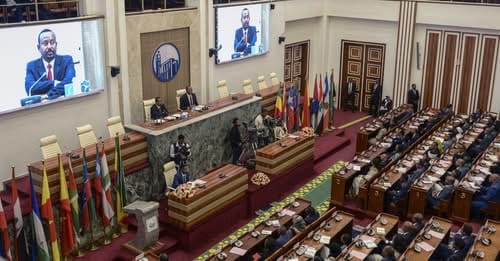
By : Abyot Alemu
The Ethiopian government is proposing amendments to the 2019 Organizations of Civil Societies Proclamation (Proclamation No. 1113/2019)—a reform once seen as a breakthrough in Ethiopia’s democratic and civic renewal. The draft amendments, introduced by the Ministry of Justice, would grant the Ethiopian Civil Society Organizations Authority (ACSO) expanded powers to control, suspend, and even dissolve civil society organizations (CSOs). While the government claims the changes aim to strengthen accountability, critics view them as a serious threat to the freedoms of association, expression, and participation. At a time when the country is seeking peace, reconciliation, and development, undermining civil society could be a dangerous misstep.
A Shift from Reform to Restriction
The 2019 Proclamation replaced the repressive 2009 Charities and Societies law, which had decimated Ethiopia’s once-thriving civic space. The reform law allowed rights-based, advocacy, and governance-related organizations to operate freely, including those receiving foreign funding. It was seen as a bold signal of democratic intent by the Abiy Ahmed administration. Now, the proposed amendments mark a reversal of that openness. If passed:
- ACSO would gain unilateral authority to suspend or shut down CSOs.
- Foreign and domestic funding could face new restrictions.
The scope of CSO activity, especially in sensitive areas like human rights, peacebuilding, or democracy promotion, could be narrowed or politicized. This is not merely bureaucratic reform—it is a potential reintroduction of state surveillance and political suppression under legal cover.
Threats to Fundamental Freedoms
The amendments undermine Ethiopia’s own Constitution (Article 31), which guarantees freedom of association, and international conventions such as the International Covenant on Civil and Political Rights (ICCPR), which Ethiopia has ratified.
In practice, the power to dissolve CSOs without sufficient judicial oversight creates the possibility for political interference, particularly against groups critical of government policy or active in conflict-affected regions. This is not just a legal concern; it has real consequences for whistleblowers, community organizers, media-linked groups, peace advocates, and watchdog organizations. A climate of fear and ambiguity may lead to widespread self-censorship, where organizations avoid bold work or controversial issues—even when such work is essential to national progress.
Civil Society as a Pillar of Democracy
No democracy can thrive without a robust, independent civil society. CSOs are more than service providers—they are educators, mobilizers, researchers, advocates, and peacebuilders. They monitor elections, train youth leaders, promote gender equality, and serve as a check on state power.
In Ethiopia’s current political context—marked by ethnic tensions, social fragmentation, and uneven development—silencing civil society would only deepen the crisis. This is particularly dangerous when institutional accountability mechanisms remain weak and dialogue across regional and ideological lines is urgently needed.
The proposed amendments effectively weaken one of the few spaces where ordinary citizens have voice and agency.
Development Setbacks
Ethiopia’s development ambitions—including the Sustainable Development Goals—rely heavily on partnerships between the government, international donors, and local organizations. In regions where the state is absent or distrusted, CSOs are often the only actors delivering education, health care, psychosocial support, and livelihoods.
Restricting foreign funding or adding heavy bureaucratic requirements will hurt smaller, community-based organizations the most—those who work closest with vulnerable populations. It may also discourage donors and development partners from continuing their support if civil society independence is compromised.
Thus, the amendments risk both short-term humanitarian disruption and long-term development stagnation.
A Dangerous Precedent
Laws do not merely regulate—they shape behavior, send signals, and reflect political direction. The current draft sends a troubling message: that dissent and independent organizing are suspect, and that civil society must operate under state permission rather than constitutional right. In post-authoritarian countries, backsliding often begins with legal tools that appear “neutral” but are used selectively. Ethiopia cannot afford to go down that path again.
What Needs to Happen
The government should halt the current amendment process and initiate a genuine, nationwide consultation with CSOs, legal experts, community leaders, religious institutions, and international partners. Legal reform must be transparent, participatory, and rooted in democratic values.
Four key principles should guide any revision:
- Due Process and Judicial Oversight – No organization should be dissolved or penalized without a fair hearing in court.
- Funding Flexibility – Particularly for rights-based and humanitarian organizations, diverse funding sources must remain legal and transparent.
- Clear Definitions – The law must avoid vague terminology that invites arbitrary enforcement.
- Protection for Advocacy Work – Speaking truth to power should not be punished—it should be protected.
Conclusion: Ethiopia’s Choice
Ethiopia stands at a crossroads. Will it preserve the spirit of the 2019 Proclamation and continue building a participatory, rights-based democracy? Or will it retreat into a past defined by suspicion, silence, and state overreach? The role of civil society in this moment cannot be overstated. Rather than being restricted, it must be recognized as a pillar of national healing, accountability, and shared prosperity. The world is watching. Ethiopians are watching. And the future will judge the choices made today.
